

Do I understand my essay title? Understanding your essay question is an important first step in getting started with your writing assignment.
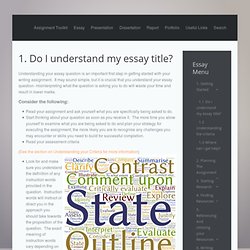
It may sound simple, but it is crucial that you understand your essay question- misinterpreting what the question is asking you to do will waste your time and result in lower marks. Consider the following: Understanding the criteria. There are some practical issues to keep in mind when starting to write your essay.
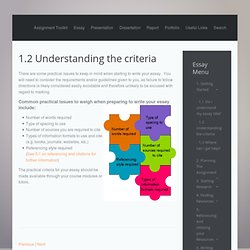
You will need to consider the requirements and/or guidelines given to you, as failure to follow directions is likely considered easily avoidable and therefore unlikely to be excused with regard to marking. Common practical issues to weigh when preparing to write your essay include: Essay instruction terms. Audience and readership. The general convention in academic writing is to assume that an essay should be comprehensible to an educated non-specialist.
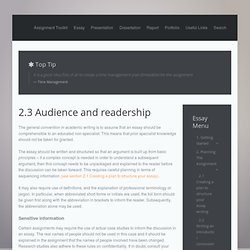
This means that prior specialist knowledge should not be taken for granted. The essay should be written and structured so that an argument is built up from basic principles – if a complex concept is needed in order to understand a subsequent argument, then this concept needs to be unpackaged and explained to the reader before the discussion can be taken forward. This requires careful planning in terms of sequencing information (see section 2.1 Creating a plan to structure your essay). It may also require use of definitions, and the explanation of professional terminology or jargon. In particular, when abbreviated short forms or initials are used, the full form should be given first along with the abbreviation in brackets to inform the reader.
Creating a plan- Structure your essay writing. Planning and organization will allow you to achieve the best potential outcome for the module you are working on.
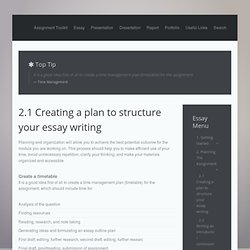
This process should help you to make efficient use of your time, avoid unnecessary repetition, clarify your thinking, and make your materials organized and accessible. Create a timetableIt is a good idea first of all to create a time management plan (timetable) for the assignment, which should include time for: Analysis of the questionFinding resourcesReading, research, and note-takingGenerating ideas and formulating an essay outline planFirst draft, editing, further research, second draft, editing, further researcFinal draft, proofreading, submission of assignment (For more information, including planning sheets and printable guides, visit our Time Management section)
Making sure your information fits your assignment. Regardless of the types of sources you plan to use (i.e. books, journals, electronic resources, newspapers, etc.) for your research, it is helpful to devise a method for ensuring your chosen references fit the purpose and criteria of your assignment.
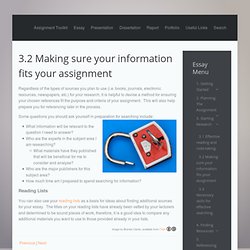
This will also help prepare you for referencing later in the process. Some questions you should ask yourself in preparation for searching include: What information will be relevant to the question I need to answer? Who are the experts in the subject area I am researching? Writing an Introduction / conclusion. Introductions Once you have created an essay plan (see the previous section), you should be able to write a basic introduction to your essay.
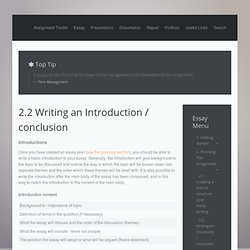
Generally, the introduction will give background to the topic to be discussed and outline the way in which the topic will be broken down into separate themes and the order which these themes will be dealt with. It is also possible to write the introduction after the main body of the essay has been composed, and in this way to match the introduction to the content of the main body. Introduction content. Essay Structure. Academic essays usually follow the standard structure that will be summarized in this section.
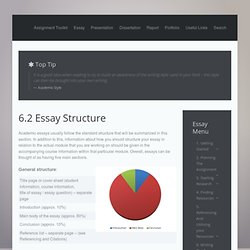
Effective reading and note-taking. Effective reading Most information used in essay assignments will come from reading texts: books, journals, reports, research articles, websites, professional guidelines, legislation, or other media.
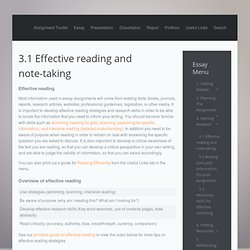
Necessary skills for effective searching. Searching for information is a common challenge and source of frustration for students looking for the materials they need to write an essay.
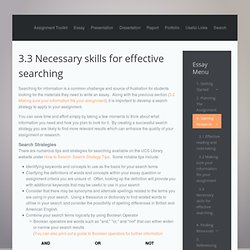
Along with the previous section (3.2 Making sure your information fits your assignment), it is important to develop a search strategy to apply to your assignment. You can save time and effort simply by taking a few moments to think about what information you need and how you plan to look for it. By creating a successful search strategy you are likely to find more relevant results which can enhance the quality of your assignment or research. Search StrategiesThere are numerous tips and strategies for searching available on the UCS Library website under How to Search- Search Strategy Tips. Some notable tips include: Finding Information. Academic Style. Academic essays use a different style of language in comparison with our use of language in everyday verbal interactions.
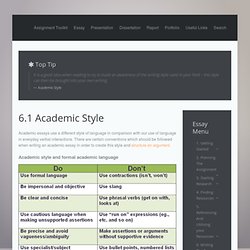
There are certain conventions which should be followed when writing an academic essay in order to create this style and structure an argument. Academic style and formal academic language Objective / 3rd person styleAcademic writing avoids using personal pronouns like ‘I’, ‘you’, and ‘we’. It uses the 3rd person instead – eg. ‘he / she / it / the practitioner / researchers’. Cautious languageMost academics use cautious language to indicate the complex nature of many issues or their own speculation regarding a question. How to Become a Descriptive Writer. Using Quotations. Critical analysis in writing.
Academic writing can be seen as consisting of two important levels of discussion: DescriptiveCritical / analytical Most essays will consist of a mixture of both these styles of writing. However, there is usually more emphasis on critical analysis over description, which means that description should be kept to a minimum and that critical analysis should account for more of the overall word count. Critical Analysis map. The first draft. Drafting and Editing. An academic essay is normally produced through a process of drafting and editing. After the first version (draft) of an essay is written, it is carefully reviewed and amended in a controlled process of improvement (editing) and rewriting (drafting), working towards a final product (finished essay) which will be the work that is submitted.
It is important that the final product is a concise, coherent and logically structured piece of writing, which has addressed all parts of the question. Editing your work. Final steps - Proofreading. Before submitting your essay, it is important to proofread your work carefully. The essay has already been drafted and edited for content, coherence and cohesion. Proofreading then is the final check completed before the essay is handed in and focuses on the following areas: Formatting – spacing, font size/style, margins, indentations, page numbers, cover sheet, reference list (see module guide for details on formatting your essay)Referencing – in text referencing (citations) and reference list (use a referencing guide to check) – please refer to the recommended referencing guide for your subject areSentence level grammar – common areas to check include: subject verb agreement, tense consistency, sentence fragments (you must write in complete sentences), use of articles – ‘a’, ‘the’, ‘zero’ article, use of logical connectors to signal argument, overuse or repetition of vocabulary or incorrect usage – use a synonym or pronoun, punctuation, spelling, and capitalization.
7.2 Submitting your essay. Where can I get help?